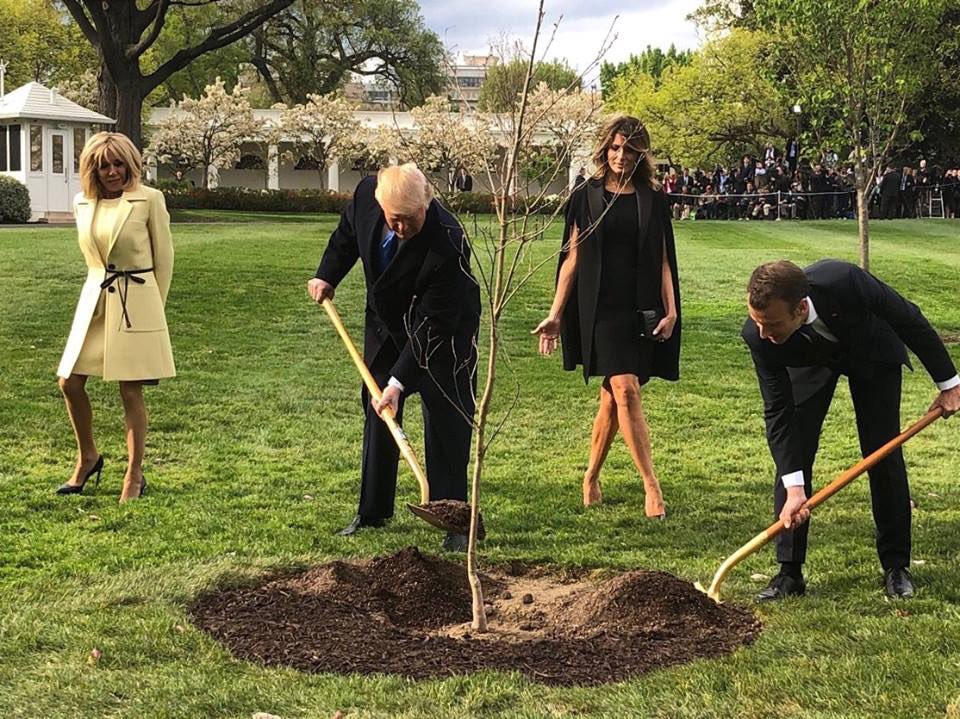But how long will influence of French President Macron last?
Developments on Day 360 of the Trump Administration:
Trump Speaks of “New Deal with Solid Foundations”
Hosting French President Emmanuel Macron, Donald Trump appears to step back from withdrawal from the July 2015 deal over Iran’s nuclear program.
Macron, in the first official state visit during the Trump Administration, was expected to urge Trump to remain in the Joint Comprehensive Plan of Action. Under the deal, Iran gave up its 20% enriched uranium — which potentially could be further enriched to 95% military-grade — suspended research and development of new nuclear centrifuges, and agreed to a rigorous system of inspections. In return, the 5+1 Powers (US, UK, France, China, Russia, and Germany) agreed to remove sanctions that had restricted Iran’s economy.
However, the US has maintained many of its sanctions, including those hindering trade and investment links between non-US companies and the Islamic Republic. Trump’s declaration of the “worst deal ever” has raised the prospect that he will refuse to extend the waiver of even wider Congressional sanctions on May 12, effectively suspending American participation in the JCPOA.
On Tuesday, Trump lashed out at the Iranian regime as “monsters” — in contrast to his praise of North Korean leader Kim Jong-Un as “very open and very honorable” — and said the agreement is “insane” and “ridiculous”.
But Trump appeared to bend to the line of the European signatories, and many within his Administration, that the nuclear agreement might be successfully revised — while at the same time maintaining his criticism and keeping open the option of withdrawal:
“Nobody knows what I’m going to do on the 12th, although Mr. President, you have a pretty good idea,” Trump said as Macron replied with a wink. Trump continued:
But we’ll see. But we’ll see also if I do what some people expect, whether or not it will be possible to do a new deal with solid foundations. Because this is a deal with decayed foundations. It’s a bad deal. It’s a bad structure. It’s falling down. It should have never, ever been made.
The European Union, France, Germany, and the UK have suggested that negotiations can begin on a parallel agreement over Iran’s ballistic missile program, even though Tehran has publicly resisted this so far. US officials are also speaking of amendments to the JCPOA to cover the expiry of its terms in 10 to 15 years, ensuring ongoing limits on Iran’s nuclear development.
Macron emphasized that the deal should not be scrapped, while setting out four guidelines for a revised agreement: 1) assurance of limits on the Iranian program through 2025 and beyond; 2) extension of the limits; 3) a ballistic missiles agreement; 4) containment of Iran by discouraging its interference in countries in the Middle East and Central Asia:
I’ve never been as critical of the J.C.P.O.A. as President Trump has, because I believe we can add to it. But not knowing the decision President Trump will take, I would like us to work on a deal to build on what has already been accomplished on the J.C.P.O.A., which is beyond the current activities, the ballistic activities and the regional influence.
While Macron’s visit appeared to pull Trump back from withdrawal, it is unclear how long the effect will last. Trump is said by officials to often hold the view of the last person with whom he has spoken, and other foreign actors are already lining up to have a word.
Israel Defense Minister Avigdor Lieberman said he planned to leave for the US on Tuesday night to meet with Defense Secretary Jim Mattis — who favors remaining in the JCPOA — and new National Security Advisor John Bolton, who has condemned the deal and threatened military action against Iran.
Lieberman said discussions will be on “Iran’s expansion in the Middle East and Syria”.
Judge Orders Government to Accept New Dreamer Applications
A federal judge has ordered the Trump Administration to resume acceptance of applicants for the “Dreamer” program protecting young undocumented immigrants from deportation.
Writing that the Trump Administration’s decision to end the Deferred Action for Childhood Arrivals program was “virtually unexplained”, US District Judge John Bates said he would stay the order for 90 days to allow the Department of Homeland Security (DHS) an opportunity to “better explain” its decision.
“DACA’s rescission was arbitrary and capricious because the Department failed adequately to explain its conclusion that the program was unlawful,” Bates wrote.
He said that, if the Department of Homeland Security did not come up with a better defense for ending the program, DACA will be fully restored in 90 days.
District court judges in San Francisco and Brooklyn had blocked the termination of DACA, scheduled for March 5, but had not mandated the consideration of new applicants.
Donald Trump commanded on September 5 that the program, authorized by Barack Obama in 2012, be ended in six months unless new legislation was passed for its continuation.
While claiming to defend the Dreamers, Trump and his advisors linked any extension to conditions such as full funding of The Wall with Mexico, a sharp increase in spending on border enforcement, termination of the Diversity Visa Lottery Program, and a large decrease in acceptance of immigrants and refugees.

